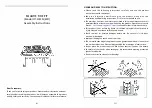
3B Scientific GmbH • Rudorffweg 8 • 21031 Hamburg • Germany •
www.3bscientific.com
Subject to technical amendment
© Copyright 2008 3B Scientific GmbH
5. Operation
5.1 General notes
Suitable voltage sources for operation of the halogen
lamp are, for example
Transformer 12 V, 60 W (230 V, 50/60 Hz) U19300-230
or
Transformer 12 V, 60 W (115 V, 50/60 Hz) U19300-115
•
Do not allow the lamp to suffer mechanical
shocks.
5.2
Producing a parallel light beam
•
Set up the optical lamp on the optical bench or
clamp it in a barrel foot and connect it to the
voltage source.
•
Set up the screen at the required distance from
the lamp.
•
Loosen the locking screw of the bulb movement
knob on the rear of the lamp.
Fig. 1 Rear side of the lamp: 1 fan, 2 locking screw, 3 bulb
movement knob, 4 sockets
•
Slide the bulb movement knob forward or
backward until a sharp image of the bulb filament
is obtained on the screen.
•
Re-tighten the locking screw.
•
To reduce the intensity of the light beam, attach
the hole diaphragm to the condenser lens using
the retaining ring.
5.3 Changing the bulb
Any deposits of fat from the skin on a halogen lamp
bulb cause the glass to become fogged and
significantly reduce the life of the bulb.
•
Do not touch the glass bulb of the halogen lamp
with fingers.
•
Remove the four securing screws and remove the
lid of the casing.
•
Take out the defective halogen bulb.
•
Holding the 12 V, 50 W replacement bulb
(U13735) with a cloth or other protective material,
push the connecting wires into the socket.
•
Screw the lid back on.
Fig. 2 Changing the bulb: 1 securing screws, 2 lid of the
casing, 3 socket
5.4 Setting up on the optical bench
•
Screw the handling rod into the base of the
optical lamp.
•
Fix the optical lamp into the rider on the optical
bench.
Fig. 3 Setting up on the optical bench






























